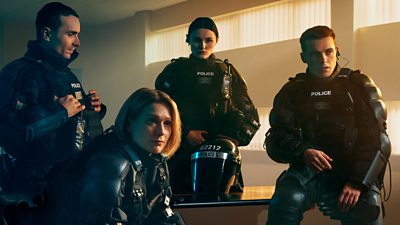
One year on from series one, Belfast city centre is awash with drugs and beset by street crime. Our response officers Grace, Annie and Tommy are no longer wide-eyed rookies, and are beginning to feel the personal and psychological effects of relentless and punishing police work.
Watch Blue Lights series 2 in full on BBC iPlayer from 6am on Monday 15 April with the first episode on BBC One from 9pm.
UM
Interview with Declan Lawn and Adam Patterson
Co-Creators, Co-writers, Co-directors and Executive Producers
How did it feel to come back to series two of Blue Lights?
Declan: Coming back for series two was like coming back to meet old friends and then devising new ways to put your old friends through torture. It was a joy to be back filming again.
Adam: Coming back for series two was a dream come true for us; to be working like this in our home town and to be able to make a show about the place that we love is something quite special that comes around really rarely.
Were you surprised at the success of the show?
Adam: The success of the show caught us off-guard because even though we had high hopes for it, you never know how people are going to react. We wanted to make a show that we were proud of, that people in Northern Ireland loved and a show they felt represented the place we all love. We invested a lot of ourselves in the first series.
Declan: The success of series one has at times been overwhelming and that’s because the show is our hearts on the screen. When other people reacted emotionally to it, that really struck us.
Why do you think the show struck a chord with the audience?
Declan: Blue Lights is set in a very specific place. It’s hyper local yet universal in its themes. Everyone has started a new job, has felt under pressure, and to some extent, everyone has found a family that’s not their own family. These things affect all of us regardless of where we are from so perhaps that had something to do with why it seemed to resonate so much.
Adam: The great television dramas that we look up to and aspire to are about family. From the outset Blue Lights looks like it’s about the PSNI but actually it’s about people and how they react when they are under pressure. We all need love, hope and optimism in our lives to get through great difficulty and I think that’s why Blue Lights has hit on that universal theme where people around the world see a bit of themselves.
How has series two been elevated from the first series?
Declan: Series two is bigger, bolder and more dramatic. Series one was about our recruits having their feet held in the fire and in series two they are firmly in the fire. The city is under siege with drugs and petty crime and they can’t work out what’s going on nor do they have the resources to deal with it. At the heart of the series is a story about a veteran, Lee Thompson, who returns to see the place he has grown up in torn apart by drugs and crime. He decides to wage a one-man revolution against the loyalist godfathers and it causes total chaos for our police officers and the city in general. Everything spirals out of control and the pressure grows.
Adam: In series one we had three new recruits in an alien world but they are now a year into the job and we see them taking a few more risks. Creatively, we are also taking more risks. There’s a lot of Belfast to look at and we wanted to shine a light on different parts of the city. One of the unifying themes about series two is how difficult it is to initiate change and our young loyalist rebel wants to change his home environment for the good but ends up having to do bad things in order to change that system. It’s about how far can you go to try and do good in the world. It’s all about the grey which is where Blue Lights lives.
How would you describe series two of Blue Lights?
Declan: The central theme of Blue Lights is idealism v pragmatism which is in the DNA of the show and in every character. We all live in the space between the two; who we want to be and who we are. This series delves further into that. Everyone has ideals but they have to compromise them. It’s about the daily grind and what that does to you and how, as a cop and as a person, you can never be exactly who you want to be. It’s also about why family matters and if you don’t have a family, often you will find yourself quite lost.
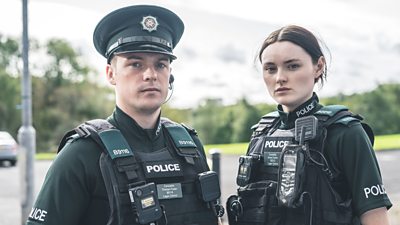
What does it mean to you both professionally and personally to have told these stories?
Adam & Declan: Firstly, Blue Lights wouldn’t exist without the proficiency of the talented cast and crew that live in Belfast. On a personal level I would say this is our life’s work. For many years through documentaries and photography we have tried to represent and understand this place and therefore ourselves and did so with limited success. What we have achieved with Blue Lights has extended beyond what we could have hoped for.
What risks have you taken with the second series?
Adam: We’ve taken more risks in the way we’ve represented the areas we are filming in and the big set pieces so I think we’ve pushed the boundaries of what we felt we could do creatively whilst still retaining that authenticity and acceptability that pertains to representing a contemporary place like Belfast. Some of what we’ve filmed has not been easy to show because it requires us to look at ourselves deeply as a society which is difficult because there are no easy answers. We are shining a light without giving the answers which creatively is quite difficult but if you have great characters at the heart of it you can accept that we don’t always need definitive answers. You just need to see how people react when they try to do something in the moment.
How has the style and tone of series two changed from series one?
Adam: Stylistically in series two we wanted to evolve and show more of Belfast and I don’t just mean having more shots of officers in Belfast but standalone shots of the city that mean something to the storyline. We really worked hard to find the tapestry and the blanket imagery that would lead into our worlds and people and that led to it feeling more visceral and real. We wanted to show more of this place that we love but that is still in many ways troubled.
Declan: Belfast is more of a character in this series and you see the full spectrum of the city which is good.
What challenges do the recruits and the other characters face this series?
Declan: Series one was about what it takes to do the job and series two is about what the job takes from you. It’s about the relentless, grinding daily pressure of doing that job and going out on those shifts, day after day. We see our recruits are still newish to the job but they’ve had to grow up fast and had to learn fast. The other difference between the first and second series is that in series one they were a small section against the world but now we see there is a danger within the team in a couple of characters who join and who aren’t a good influence. It’s about what happens when this group is contaminated from outside and the conflict, pressure and danger that engenders.
Adam: We meet our recruits a year on but have they retained that optimism and hope that we saw when they first joined the force? If not, psychologically how does that affect them and the people around them? How do you continue to put yourself in danger if you’ve lost the belief that you can really change the world and I think that defines the character developments in Blue Lights.
How did you want to tackle the aftermath of Gerry’s death in series one?
Declan: All good things come from trauma and tragedy at their heart. The death of Gerry was calculated for us because we knew it was going to be the genesis of series two. We knew that tragedy would bond the section together and they would never forget him and the show would never forget him. It’s about how great things can come from grief. My hope is when the audience get to the end of series two that no one asks ‘why did you kill Gerry?’
Adam: The whole creative team made a conscious decision to move the story a year on. Part of the reason for that is that if we had picked it up right away then every story would have been consumed by Gerry and we needed the actors to go on different journeys. In a lot of ways he still lives on in many of our characters but by moving the story on a year it allows us to look at different parts of the police and parts of the city.
Meet the Blue Lights Series 2 Cast
Siân Brooke (Grace Ellis)
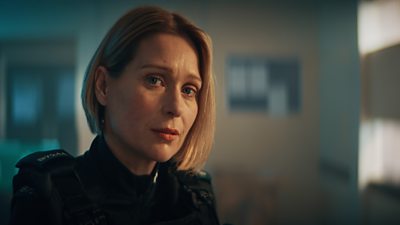
How has Blue Lights moved on from the first series?
Now we know who these characters are, we dig deeper into their lives and understand why they react in certain situations. The world that Declan and Adam have created has expanded even more and you begin to understand the complexities of the crimes the characters are encountering in their day-to-day jobs. We also see the ripple effect of what happened in the first series on all of the characters and how it impacts them as a unit.
What’s Grace’s home situation?
A year has passed so she’s no longer a recruit. She’s much more experienced in the job but her home life has turned upside down. We see her whole foundation has been rocked by not having Cal at home with her anymore. She is a little at sea and I like the fact that we portray empty nest syndrome. I know from friends whose children have left home that it’s almost an unexpected loss that they experience. I don’t think it’s explored enough on television but it’s a tangible thing that happens to parents and they go through a grieving process of sorts.
How has Cal’s departure for university impacted Grace’s living arrangements?
Grace and Annie have now moved in together. Grace has a caring quality to her and she can’t help but take Annie under her wing. She needs to have someone there almost as a distraction to what’s going on in her life. What comes with that though is the frustrations of living with an adult who lives like a student but the dynamic between Grace and Annie is really lovely.
How has Grace’s partnership with Stevie developed since series one?
They have made these clear boundaries between their work lives and personal lives; listening to their heads rather than their hearts. They are both trying to navigate that and we will see throughout the series the fallout of that agreement.
What challenges does Grace face this year?
Grace is caught up in a serious incident that involves her pulling out her gun. I did talk at length to one of our police advisors about how you have to commit to that once you pull your weapon. I wanted to know what that does to you as a police officer and as a human being. You have to come to terms with the fact that you are prepared to take a life in order to save someone else from harm and it really does alter how you feel after that. That sort of incident doesn’t happen very often and isn’t an everyday occurrence within policing.
Why do you think the show was such a big success and resonated with audiences?
I think it was a hit with audiences firstly because of Adam and Declan’s writing and the fact this is a character-led drama. You care about these people immediately and they are relatable. I also think that telling the story of modern policing in Northern Ireland has been educational for audiences who think they might know this world but don’t and were intrigued, surprised and engaged by it.
What can audiences expect from the second series?
The stakes are high. It will be quite explosive, moving and an authentic reflection of some parts of present-day Belfast, but audiences can still expect those comedy beats alongside the serious side of the story.
Martin McCann (Stevie Neil)
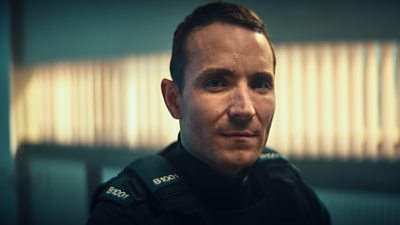
How has Blue Lights moved on from the first series?
The story picks up a year on and Stevie is still rustling up dishes at home to bring in for lunch and he’s a pretty straightforward guy. He’s gotten to know Grace a lot more and they’re out on the beat doing what they do as police officers.
What’s it like coming back to Blue Lights?
It’s been lovely to see everyone again and come back to a world that feels familiar. It felt easy this time because we know the characters so well. It felt safe and a fun environment to come back to.
Has the relationship between Stevie and Grace progressed since series one?
It’s obvious there is a spark between them but they have created boundaries between their work lives and personal lives. Stevie wants to protect Grace from harm but that comes at a cost and we see how that plays out in the series.
What can audiences expect from the second series?
The stakes are high and audiences will see a ramp up in the gravity of some of the situations that they have to face. The criminality in the second series is darker as they face more sinister forces in this series than they did in series one. This criminality has far-reaching consequences on the communities and is incredibly challenging for the team to sort out. It’s also disheartening for our unit as they try to keep up their morale while holding onto why they became police officers in the first place.
Why do you think the show was such a big success and resonated with audiences?
I think the show was a hit with audiences firstly because it was so beautifully written and crafted by two very talented screenwriters, Adam and Declan. They made it easy for us to literally perform what was on the page. It had heart and we made it with a lot of passion, love and soul and put our best into it. None of us knew at the start of this whole process that it would be received by the audience the way it was. I think it all happened at the right time and the audience took to it because it had heart.
What did it mean to you to make this show about your hometown, in your city and in your own accent?
I particularly loved making Blue Lights because it is inherently a Northern Irish story, and it means that I get to be close to my family and friends. I enjoy being at home and getting the opportunity to play someone that sounds like me makes it all the more familiar and enjoyable. I like the character I play and the brilliant actors I get to work with every day. I never stop learning on the job and this is the best I’ve had as it’s home grown and the writing is fantastic!
What are the underlying themes of Blue Lights?
Relationships and human interaction are the core themes underpinning the show which I think is a big draw for audiences.
How would you describe the show?
It’s a show about ordinary people in extraordinary circumstances who are brave enough to take on this challenging profession.
Katherine Devlin (Annie Conlon)
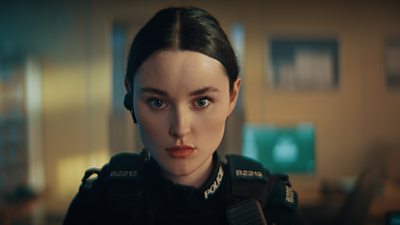
How has Blue Lights moved on since series one?
It’s moved on with new characters coming into the picture which has naturally changed the dynamic but it still has that Blue Lights quality to it with Declan and Adam’s attention to character detail that makes it so authentic.
Do we see that disruptor influence in Annie in S2?
Annie can adapt very quickly to situations. She’s a quick thinker and relies on her intuition. She should probably think a bit more before jumping into certain situations and circumstances but you do get to see Annie let her hair down.
We find her thrown together with a new partner Shane Bradley - how does she adapt?
There’s definitely a spark between them however they are very different as people and they think very differently and react very differently. They’re not afraid to call each other out and there’s something about Shane‘s effortless confidence that’s appealing to Annie.
What’s the chemistry like between them? Do they get on?
They do get on but she begins to question his integrity and morals as the series progresses and I think Annie is challenging for him too. Annie’s not afraid to question him or to delve deeper into what his motives are.
How has her own life moved on? We saw her having to move out of her home - where is she now?
This time round we find Annie sharing a flat with Grace. Theirs is quite a sisterly relationship but equally, they’re aware of each other’s insecurities and flaws. Grace has been there for Annie in the past and Annie definitely shows her vulnerabilities when she’s with Grace. They make a good team and while the death threat is still present in Annie’s life we do see her unfold a bit more and be less constrained – she definitely has more freedom.
How did you find getting back into the uniform this time round?
It was amazing to be back in Annie’s shoes and the physicality of the uniform was easier the second time round put the uniform back on and it was so much easier the second time round - even just getting in and out of the car in the kit was easier. It was almost like the muscle memory kicked in.
Did you have to undertake any stunts this time round?
We had lots of bigger set pieces this year and I did do a lot of my own stunts which was quite terrifying but really exciting too.
Why do you think Blue Lights was such a success both at home and across the UK?
I think it’s down to the authenticity at the heart of the show. We see time and time again when a show is unapologetic and real, audiences really engage with it. It’s a drama with really beautifully crafted characters at its heart and it doesn’t spoon-feed the audience which is so important. You may have scenes that aren’t dialogue-heavy, but they leave room for the audience to make their own minds up about what’s happening.
What can audiences expect from the second series?
Grit, uncomfortable situations, humour and warmth.
Nathan Braniff (Tommy Foster)
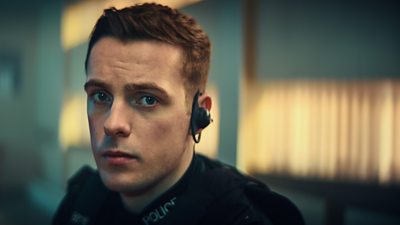
How has Tommy come to terms with the loss of his partner Gerry?
Tommy is still grieving despite it being a year since Gerry’s death. I think it’s something that will stay with Tommy for the whole of his police career. It was very difficult from the start but it was the same for everyone on the unit as Gerry occupied a special place for them all.
How has he adapted to sharing a squad car with another partner?
It depends on who Tommy is in the car with. He doesn’t have a regular partner but he gets on with Annie and Sandra like a house on fire. However, there are a few new faces in the second series that Tommy doesn’t necessarily see eye to eye with and that leads to some issues further into the story.
Did you do any additional research this year?
I did some more research this year to do with body language of how police handle themselves in certain scenarios. Normally you would look someone in the eye if having a conversation but when you are faced with a heightened situation you have to take in so much detail around you and police tend to stand at angles to the person they’re talking to. I took all those details and more with me into the second series.
How has his own life moved on? He seems more confident and isn’t the green recruit we met in series one?
In Tommy’s personal life we see him having a love interest in the second series. You see how Tommy’s confidence with women is extremely low when it comes to dating and it’s like he’s going through this for the first time. Although he’s not green to the job anymore, he is still a bit green when it comes to navigating his new love interest.
We see DI Murray Canning takes an interest in Tommy? Why is that?
Canning tries to bring Tommy into his clique with Shane because he can see how loyal Tommy is and was to Gerry and he sees potential there. He also recognises Tommy’s ability to see patterns and numbers in a different way to other people and sees that as a real skills asset. Finally, Tommy is easily influenced and Canning can see that and plays to that to Tommy’s detriment.
What new skills have you had to learn this time round?
Some things needed to change for Tommy from series one to series two and for me personally as an actor. I lost a bit of weight, which I thought was right for the character and I started doing a bit of kickboxing to toughen Tommy up a little bit. He needed to toughen up in order to survive in the police force in Northern Ireland. As a result we see Tommy sticking up for himself more and we see that tenacity and diligence pay off for him.
Joanne Crawford (Inspector Helen McNally)
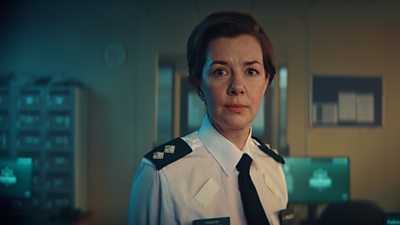
How has Blue Lights moved on from the first series?
It’s a year on and one of the big changes for everyone is that Blackthorn station has amalgamated with another bigger station so they’re rubbing shoulders with the senior team like Nicola Robinson and CID on site. This time around there are staff shortages to deal with and this affects Helen’s team.
How is Helen coping in her new role as Inspector?
In the position of Inspector, Helen has to have an eye in both directions – she has to keep watch over her officers but she also has to be aware of the machinations of how the organisation works at a senior level. Helen’s instincts are first and foremost to be aware of the safety of her people and that will always be her motivation in the job. Nicola has seen potential in Helen but she is still figuring out how she feels about this new post. She’s in a tricky layer of middle management and trying to figure out that equation of power and responsibility.
Do Helen’s relationships change with her colleagues in series two?
Helen and Sandra are both people-focused officers and even though Sandra is a Sergeant, she’s much more on a par with Helen, despite Helen’s promotion. There’s a natural friendship between them. With Jonty, we saw that they have more of a sibling relationship and they’ve known each other for a long time which allows her to be pragmatic when they come across each other’s work paths.
What new challenges does Helen face?
Helen is in a bind because expectations of her are extremely high and decision-making has been taken out of her hands. She is also dealing with a new threat on the streets and they need more intelligence. The sands are shifting in the community and there’s a blind spot on intel so they aren’t sure about what they are even looking for out there which puts the team at a disadvantage. Add to that the issue of being short-staffed and Helen has a real problem on her hands.
Why do you think the show was such a big success and resonated with audiences?
I think it was a hit with audiences firstly because of Adam and Declan’s writing and the fact this is a character-led drama. It’s also because you care about these people immediately and they are relatable. I also think that telling the story of modern policing in Northern Ireland has been educational for audiences who think they might know this world but don’t and were intrigued, surprised and engaged by it.
What can audiences expect from the second series?
The stakes seem higher in series two. It will be explosive and moving.
Hannah McClean (Jen Robinson)
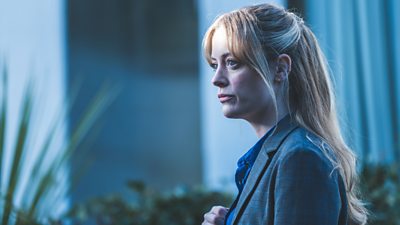
Where does the story pick up in the second series of Blue Lights?
Blue Lights comes back to most of the familiar faces we met in series one but our world has expanded. We look at different pockets of Belfast with different crime families and how that affects policing for our unit. The story has also expanded in terms of where we find Jen who is no longer a response police officer. We saw her leave her role at the end of series one following the death of Gerry.
What is Jen’s new job and what made her take that particular career direction?
Jen is now working as a solicitor in a respected Belfast solicitor’s firm and she finds out she’s been made permanent. Like her mother Nicola, Jen trained to be a lawyer before joining the police force. It transpired that policing wasn’t for Jen and she quite rightly stepped back. We also learn that she hasn’t dealt with the events of series one. She’s thrown herself straight into work without having any counselling for the trauma she encountered and she buries herself in her work as a distraction technique.
How does Happy Kelly and Jen’s friendship from series one progress in this series?
In series one Jen didn’t like a lot of people but she recognised something in Happy that she wanted to take care of. A childhood friend of Gerry’s, whose father and brother were killed by a bomb in a chip shop in the 1970s, Happy has struggled to come to terms with that trauma and loss all his life. Jen gained Gerry’s respect by the way she looked out for Happy as Gerry had done. When Gerry died, Jen stepped in and took Gerry’s place. Happy is likely the only friend Jen has right now. As a result of this closeness Jen decides she wants to try and seek justice for Happy and through her job, she has access to records and documents that might lead to some answers and closure for Happy.
Has Jen’s relationship with her mother Chief Superintendent Nicola Robinson, improved?
In the immediate aftermath of Gerry’s death, Nicola and Jen seemed to come together but early in series two, you can feel something bubbling under the surface of their relationship. Jen is angry that her mother didn’t allow her to resign when Jen wanted to. She wouldn’t have been present at Gerry’s death and she wouldn’t have shot and killed someone if she had been allowed to resign. She will always question her actions on that day and so she blames her mother for that, rather than doing the work on herself.
What can we expect from Jen in this new role?
Jen’s focus is entirely on the case she is working on and as a result, she doesn’t fully work through the possible repercussions of her actions. She doesn’t stop to think what excavating the past like this will unearth. She gets a bit lost and there is real danger that her actions will cause more harm than good despite coming at it with good intentions. Jen starts digging in areas she’s warned to steer clear of and finds out things she shouldn’t. She is then faced with the challenge of how to handle this information in a moral way that’s beneficial to people and not harmful.
Why do you think Blue Lights resonated with the audience?
I think the authenticity and detail in Adam and Declan’s writing really spoke to the audience and it also rang true to people from Northern Ireland. The drama portrayed the landscape of Northern Ireland in a way that we hadn’t really seen before in a drama and that was appealing to audiences. The characters were fully formed and there’s such a wealth of detail that fans of the show found relatable.
What can audiences expect from the second series?
We will get to know these characters in a bit more detail and see their relationships grow stronger. We meet new characters with new challenges and there’s a lot more action in series two. Some great big dramatic set pieces that will look amazing. Slowly our view of Belfast is expanding and we are getting to meet more and more people from more corners of the city.
Andi Osho (Sergeant Sandra Cliff)
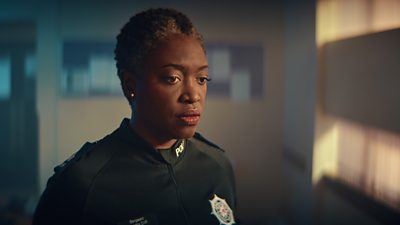
What was it like to return to the stories of Blue Lights
Coming back for season two was a real gift. You never know what’s going to happen after a show airs or if you'll get to go again so to have another shot at playing Sandra who is a character I’ve loved, has been a real joy. And because the story now brings in new characters and new tensions, its been exciting to explore all that.
How has Blue Lights moved on from the first season for Sandra?
There’s a question mark at the top of the show for Sandra over whether or not she should stay and what the job and future look like for her after everything that happened in the first season. Gerry was the reason she was in Belfast in the first place and she’s quite close to police retirement age so she’s really having to consider what’s next.
Where do we join Sandra in the second season?
Sandra is no longer behind the custody desk. She’s been released out into the wild! She’s replaced Helen as the section skipper for the response team and that brings with it a different level of responsibility. She now has to deal with a lot of different elements in her working day but I think she probably enjoys getting stuck in and appreciates the distraction.
What are the wider challenges the team face this year?
In this show, I think Declan and Adam are trying to portray the grey areas and challenges of policing a major city and how a lack of resources impacts that. And so in season 2, there’s this constant tension between the realities of policing juxtaposed against policing by the book. The response officers are constantly having to make practical decisions, while the senior officers, Nicola, Helen and Canning, are thinking strategically. However, those strategic choices don’t always make sense for those on the front line and even within that, the senior officers don’t always agree on how best to execute these strategies. So basically, there’s tension in a directions with flashpoints coming up in every episode.
Do we get to see Sandra out and about on the streets getting stuck into the job?
One of the joys for me in season two was getting out there and dealing with some criminals so I’m delighted that Sandra is out from behind the desk. Not only is that fun to play but I’ve learnt a lot about what it takes to be a police officer. I love finding the detail. That helps me build the character. How they carry themselves, the kit, the cars, the uniform all adds a level of authenticity which I think the audience responds to.
Why do you think the show was such a big success and resonated with audiences?
I could tell the scripts were special but you can never predict how an audience will react. I think people resonated with Blue Lights because it’s not a police procedural, it’s about people who happen to be police officers and the show invites you into their world from a human perspective, not a policing one.
What can audiences expect from the second season?
It’s definitely bigger in scale and more of a pressure cooker as the response officers deal with more challenging situations but as always, it’s all about the stories, the relationships, the challenges and really how we as humans respond to all that.
Frank Blake (Shane Bradley)
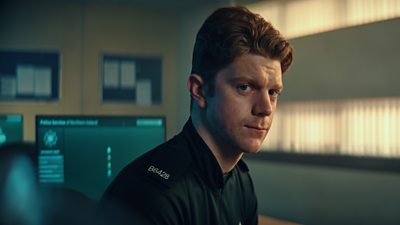
How does new character Shane Bradley fit into Blue Lights?
Shane is new to the team and has been brought in by Murray Canning to boost the section as they are short-staffed. Shane thinks he’s a bit above the response work and aspires to work in a job like Canning’s and perhaps get out of uniform. He’s a results-driven officer and doesn’t play by the rules, which gets him into a bit of hot water along the way.
How far is Shane prepared to push the letter of the law to get Canning the results he seeks?
I believe Shane is a good police officer and he’s similar to Canning in that he isn’t afraid to break a few rules to get the results they need. He enjoys the thrill of the job however, his inexperience in some aspects of the job means he makes mistakes and gets him into trouble. Fundamentally he has the interests of the public at heart.
Who does Shane interact with on the job?
Shane is partnered with Annie on the beat together and on patrol and they get on very well being a similar age. I think Annie is intrigued by Shane’s method of policing and he likes to show off in front of Annie. There is a spark between them for sure but where it leads to is anyone’s guess. Shane also goes on patrol with Tommy and we see him interact with Grace and Stevie in certain situations they get called out to.
What was it about the show you were drawn to?
I watched series one when it was on air, really enjoyed it as a viewer and was delighted to come on board series two as one of the cast. Des texted me about the part of Bradley when he’d read the script suggesting I go for it and in true ‘art imitating life’ fashion it’s Canning who gets Shane to come to work with him in Belfast.
What are the underlying themes of Blue Lights?
It’s explosive and it’s about relationships with human interaction at its heart.
Desmond Eastwood (Detective Murray Canning)
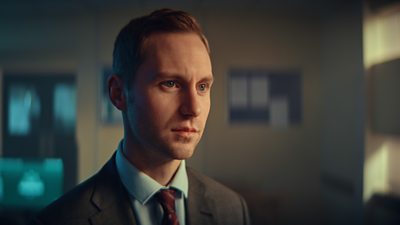
How has Blue Lights moved on for Canning?
Murray Canning finds himself working with the PCTF - Paramilitary Crime Task Force and has been set the challenge of investigating the increasing drug problem in the city centre. He’s handpicked Constable Shane Bradley to help with that. We see him using various police officers with different skills and qualities to gather intel and get to the bottom of what’s going on out on the streets of Belfast.
Why does Canning recruit Tommy to join his intelligence gathering and what does he see in him?
Canning sees Tommy displaying certain aptitudes that lead him to think Tommy would be a great asset to his intelligence led police unit. In addition he sees Bradley as a heavy-handed officer who doesn’t mind getting into the less savoury aspects of the job. Canning takes the view there are alternative ways
How does Canning deal with the friction that arises between him and Helen McNally?
Inspector NcNally does everything by the book which in Canning’s opinion can only get you so far. Murray likes to bend the rules to get results. It would seem that their superior officer, Nicola Robinson shares that point of view and is always looking at the wider picture. Helen and Canning clash at times and despite having different ways of doing things they ultimately want the same thing.
Is Canning a good police detective?
Murray Canning is a good police detective albeit at times he crosses the line in order to achieve results. In his opinion that has to be done. He makes mistakes but ultimately he’s trying to do the right thing. He interacts a lot more with McNally and Chief Inspector Nicola Robinson this series to try and achieve a desirable outcome.
Why do you think the show was such a big success and resonated with audiences?
There’s a number of things. Certainly a major part of the success is down to the writers / creators Adam Patterson and Declan Lawn. With their journalistic backgrounds, they’ve provided vast amounts of detail the level of research they put in has made Blue Lights very authentic and realistic. It’s set in Belfast, made by the people from Northern Ireland and that shines through on the screen.
How would you describe the show in a few sentences?
An authentic, vibrant, dynamic portrayal of front line police work in Belfast.
Seamus O’Hara (Lee Thompson)
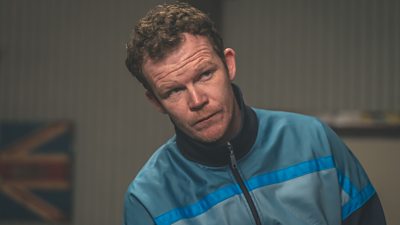
Who is Lee Thompson and how does he fit into Blue Lights?
Lee Thompson has lived away from Belfast and seen a lot of the world during his time in the army. After serving in Afghanistan he sees a different kind of war on the streets of Belfast. He very quickly identifies a new enemy - drugs – a threat to the well-being of his community and he goes after that with everything he’s got. Lee cares deeply about his people and has real pride in being a Protestant from East Belfast. A man who has fought for his country and is fiercely proud of the traditions he grew up with.
What are his ambitions for the Mount Eden estate?
Despite the pride he has in his roots, there’s a loss of self-belief among the people of Mount Eden and when they talk about being from Northern Ireland these things really matter to their identity and ultimately their self-esteem. Lee’s ambition is to restore that sense of pride because once they have that back they won’t let it be taken away. He talks about ‘going back to how it used to be’.
Describe his relationship with Rab?
Rab is Lee’s uncle. Lee’s father died when he was young due to the stresses of trying to keep a local business going with paramilitary groups taking weekly protection payments. Rab represents a father figure for Lee, however Rab is also a man burdened by his past. He’s now a community man through and through and Rab represents an ideal and is a role model for Lee.
Describe Lee’s relationship with his sister and nephew?
Mags is fiercely protective of her son as is Lee of his nephew. Despite living in a post-conflict world it doesn’t feel like it’s post-conflict on the Mount Eden estate. Having lost their parents at a young age, Mags and Lee are undoubtedly close but as the series progresses we see her questioning some of Lee’s choices.
What was it like to join an established cast?
What I love about working in Northern Ireland is that everyone knows everyone which means that as soon as you walk on a set you have a shorthand and it feels like an ensemble. Everyone was so welcoming and gave me room to navigate and collaborate on the character and that boils down to trusting the actor and giving them space to create.
What research did you do?
I knew a lot already but I did research the role because I was playing someone from a background I’m not from. That’s a world of tradition that I had to examine to ensure I had no preconceptions or assumptions about that community. A fellow actor took me on tours of Belfast so that I could look at it with fresh eyes. What I wanted to discover most of all was what Lee was most proud of as a unionist man and as soon as I started to explore that it pushed me in the right direction.
Seána Kerslake (Mags Thompson)
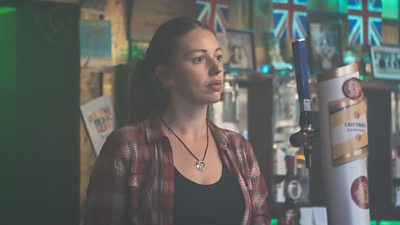
Who is Mags and where does she fit into Blue Lights?
Mags Thompson is the co-owner of The Loyal pub in Mount Eden in Belfast along with her brother Lee who has taken it upon himself to try to take over running the estate in Mount Eden. Mags watches this unfold as the story progresses while trying to protect her son Henry, and their way of life.
What threats does Henry face that Mags feels she needs to protect him?
Henry is 12 and is always involved in the running of The Loyal pub and around his uncle and his friends. Mags is fiercely protective of him but he is at risk of being exposed to some hard truths and she wants to shield him from that. His relationship with his Uncle Lee, whom he idolises, is fundamental to how the core story arc pans out. Henry looks up to Lee and his military background and his ideals about truth, honour and loyalty are all very admirable things that Henry is impressed by.
Is Lee a role model for Henry?
Henry’s father and grandfather are not in the picture for Mags and Henry so Lee is one of his core male role models along with his Uncle Rab. These two men are his only guides to show him how to behave in the world.
What is Mags relationship like with her brother?
Lee and Mags are extremely close because of the way they grew up in the family bar and losing their mum at a young age and then their dad too. The fact that they’ve had to run a business and grow up a little bit quicker too through the loss of their parents as well as the environment in which they live. Their relationship is really close and they definitely get through to each other more than someone else would.
How much does Mags know about what Lee is really up to?
She thinks she knows what’s going on but throughout the course of the story we learn that he has been keeping many secrets from her. It’s a grey area for Mags in what she knows and doesn’t know. What she chooses to turn away from and what she chooses not to be present for. Underlying everything is her determination to protect her son and the lengths she is willing to go to.
What are her views on Lee’s ambitions for the Mount Eden estate?
Like the saying, ‘the road to hell is paved with good intentions’, I do think Lee fundamentally is a good guy and I don’t know why he goes down the road he heads down or where that change in him originated. Some of the decisions she makes are the hardest she’s ever had to make and have massive repercussions for her.
What was it about Blue Lights that made it such a hit?
I was so glad to see a homegrown drama, shot in Belfast, with a really strong cast from Northern Ireland, Ireland and the UK. Character is always a driver for me and I think the humanity of the characters hooked me in. Declan and Adam have really given us all something else to play off this series which is so exciting for an actor. I hope the audiences like the new storylines and take to the new characters.
Cast
Siân Brooke - Grace Ellis
Martin McCann - Stevie Neil
Katherine Devlin - Annie Conlon
Nathan Braniff - Tommy Foster
Joanne Crawford - Inspector Helen McNally
Hannah McClean - Jen Robinson
Andi Osho - Sergeant Sandra Cliff
Desmond Eastwood - Detective Murray Canning
Andrea Irvine - Chief Superintendent Nicola Robinson
Frank Blake - Shane Bradley
Jonathan Harden - Inspector David ‘Jonty’ Johnson
Derek Thompson - Robin Graham
Seamus O’Hara - Lee Thompson
Seána Kerslake - Mags Thompson
Alfie Lawless - Henry Thompson
Abigail McGibbon - Tina McIntyre
Paddy Jenkins - Happy Kelly
Dan Gordon - Rab McKendry
Dearbhláile McKinney - Aisling Byrne
Crew
Stephen Wright - Co-Creator, Executive Producer, Two Cities Television
Louise Gallagher - Co-Creator, Executive Producer, Gallagher Films
Nick Lambon & Heather Larmour - Executive Producers, BBC
Declan Lawn & Adam Patterson - Writers, Co-Creators, Directors, Executive Producers
Bronágh Taggart - Writer Eps 3
Noel McCann - Writer Ep 4
Declan Lawn & Adam Patterson - Directors Eps 1-3
Jack Casey - Director Eps 4-6
Amanda Black - Producer
Stacey Quigley- Line Producer
Paul Morris & Angus Mitchell- DOPs
Ashleigh Jeffers - Production Designer
Georgia Simpson - Casting Director
Maggie Donnelly - Costume Designer
Natalie Reid - Hair and Make-up Designer
Steve Singleton, Stephanie McCutcheon, Helen Sheridan - Editors